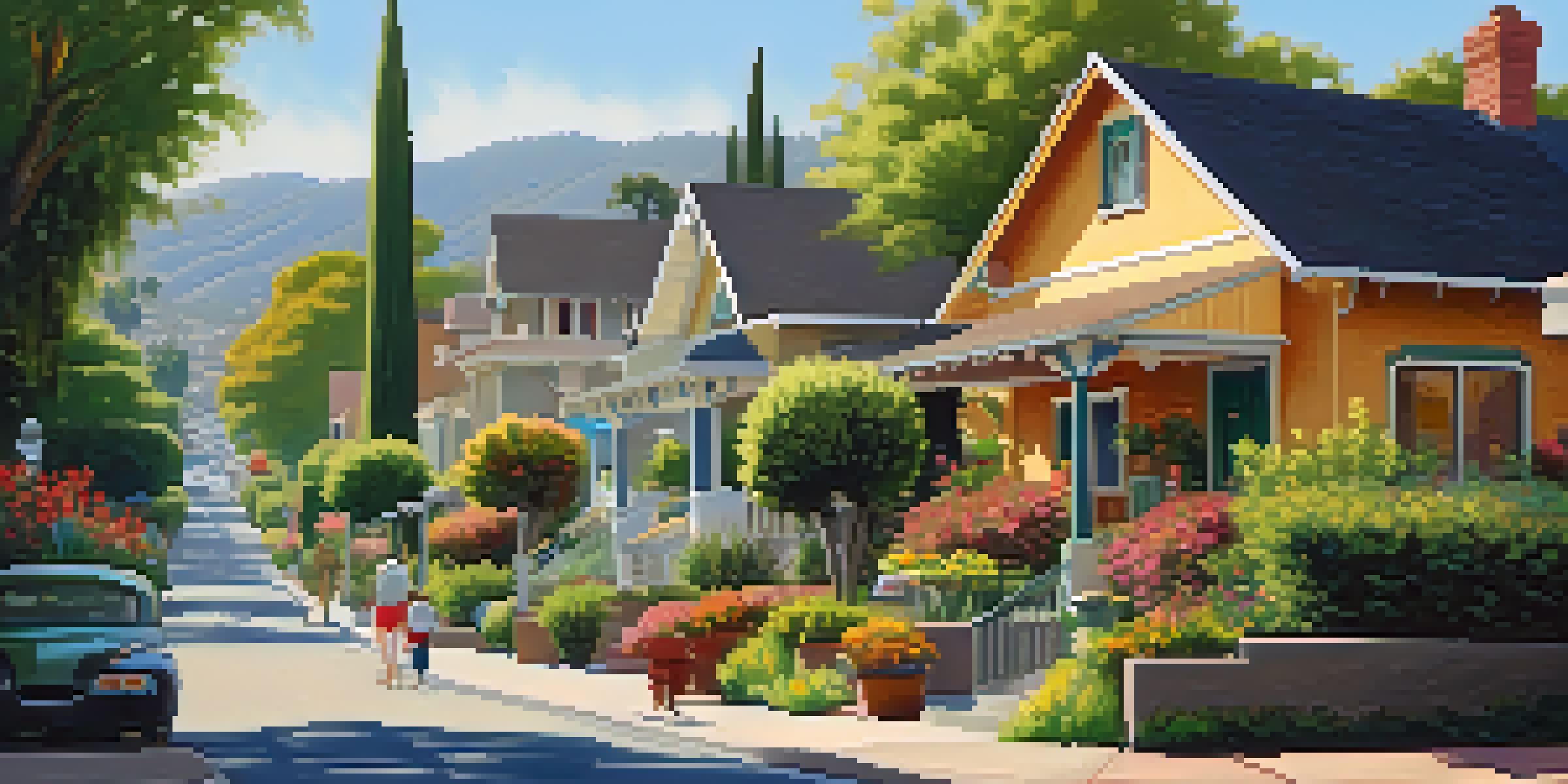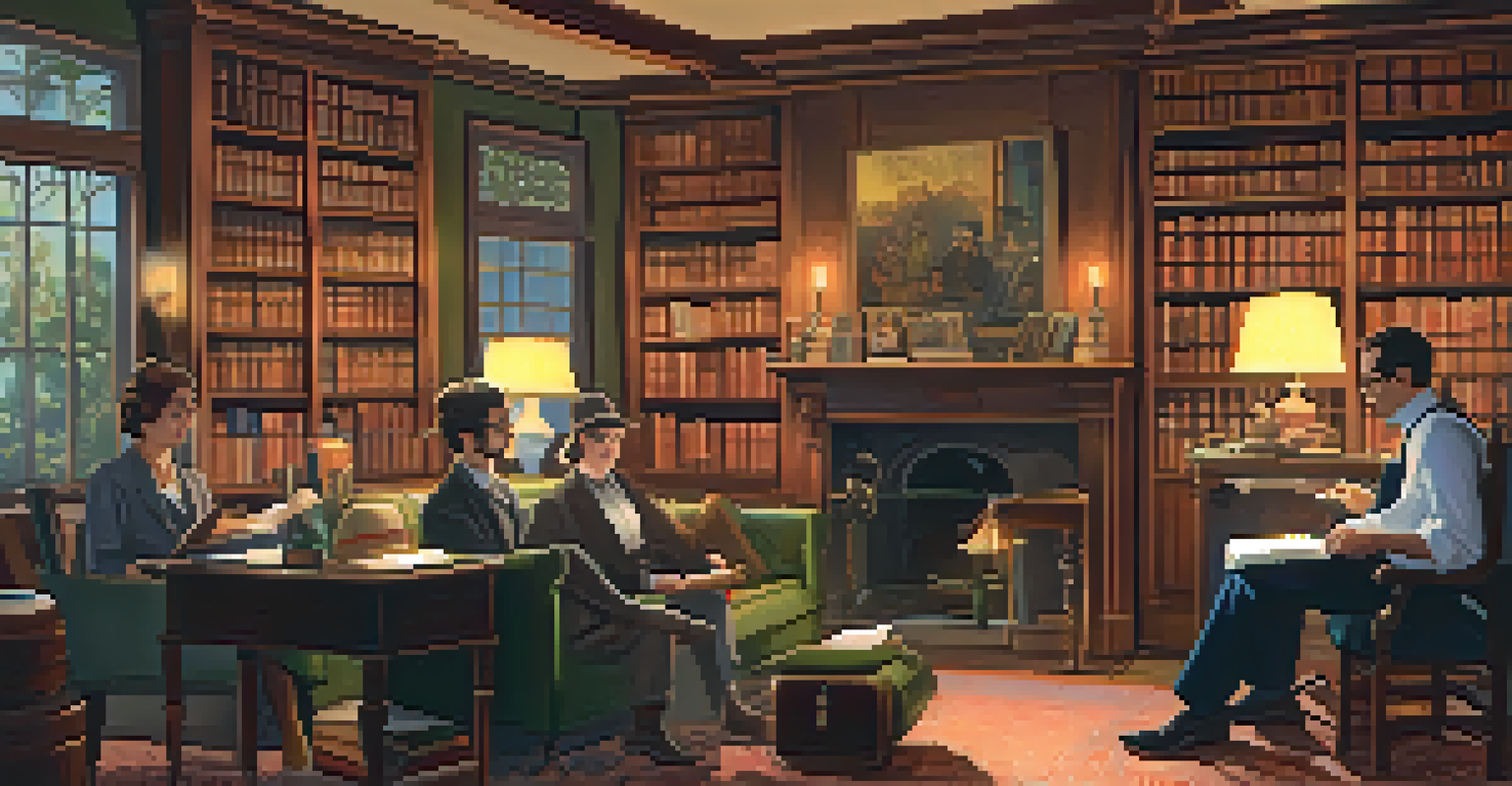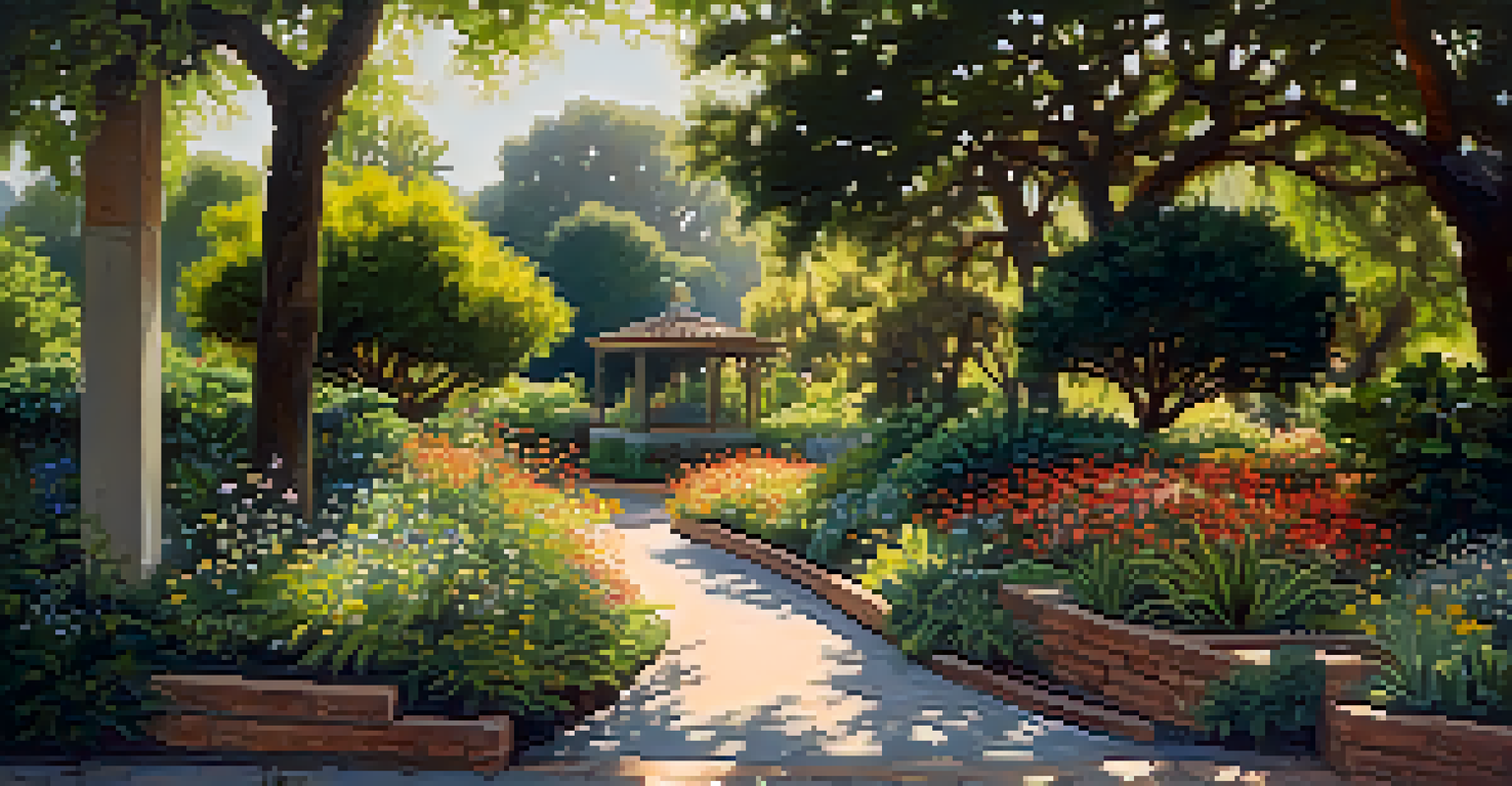The Role of Pasadena in the American Literary Movement

Pasadena: A Hub for Literary Innovation in the 20th Century
Pasadena emerged as a vibrant center for literary innovation in the early 20th century. Writers, poets, and intellectuals flocked to the city, drawn by its sunny climate and burgeoning cultural scene. This influx created a melting pot where diverse ideas and artistic expressions could flourish. Notably, the city nurtured a community that encouraged collaboration and creativity, making it a hotspot for literary talent.
Literature is the most agreeable way of ignoring life.
The presence of institutions like the Pasadena Playhouse and various literary salons provided platforms for emerging writers. These venues became breeding grounds for new ideas, allowing authors to experiment with their craft. The supportive environment paved the way for groundbreaking works that would influence American literature for generations to come. This sense of community was crucial in solidifying Pasadena's reputation as a literary haven.
As the city grew, so did its reputation for hosting influential literary figures. Renowned authors such as Charles Bukowski and John Steinbeck spent significant time in Pasadena, contributing to the local narrative. Their experiences in the city often found their way into their writings, reflecting the unique blend of culture and creativity that Pasadena offered.
The Influence of the Arts and Crafts Movement
In the late 19th and early 20th centuries, the Arts and Crafts Movement left a profound impact on Pasadena's literary landscape. This movement emphasized craftsmanship and artistic expression, attracting writers who were inspired by its ideals. The focus on simplicity and natural beauty resonated deeply with many authors, influencing their writing styles and themes.

As writers engaged with the principles of the Arts and Crafts Movement, they began to explore themes of authenticity and connection to nature in their works. This shift encouraged a more introspective approach to storytelling, allowing for richer character development and emotional depth. The movement's emphasis on community and collaboration also fostered a spirit of camaraderie among local writers.
Pasadena: A Literary Innovation Hub
In the early 20th century, Pasadena became a vibrant center for literary talent, fostering collaboration among writers and nurturing groundbreaking works.
Prominent literary figures found themselves inspired by the aesthetics of their surroundings, leading to a surge in nature-themed literature. The lush landscapes and picturesque views of Pasadena became a backdrop for many stories, enhancing the connection between place and narrative. This melding of art and literature created a unique cultural fabric that defined the era.
Pasadena's Role in the Development of Modernism
Pasadena played a pivotal role in the rise of modernism, a literary movement that sought to break away from traditional forms and explore new narrative techniques. Writers in Pasadena were at the forefront of this evolution, experimenting with stream-of-consciousness writing and fragmented narratives. This bold approach reshaped the way stories were told, allowing for greater exploration of the human psyche.
The role of the writer is not to say what we all can say, but what we are unable to say.
The city's literary salons and gatherings provided a space for modernist writers to share their ideas and refine their craft. These interactions sparked innovative thinking and encouraged authors to challenge societal norms through their work. As modernism gained traction, Pasadena became synonymous with literary experimentation, attracting those eager to push boundaries.
With its rich history of supporting avant-garde literature, Pasadena became a beacon for modernist writers from across the country. This influx of talent contributed to a dynamic literary scene, leading to the publication of works that would define the modernist era. As writers explored new frontiers, Pasadena solidified its legacy as a key player in the evolution of American literature.
The Impact of the Pasadena Playhouse on Local Writers
The Pasadena Playhouse has long been a cornerstone of the city's artistic community, significantly influencing local writers. Established in 1917, the Playhouse became a breeding ground for new talent, showcasing innovative plays and fostering collaboration among artists. Writers found inspiration in the dynamic performances, often drawing from the theatrical experience for their own literary works.
The Playhouse’s commitment to nurturing emerging writers created opportunities for local talent to shine on stage. Many playwrights, poets, and novelists had their works performed here, providing invaluable exposure and feedback. This supportive environment allowed writers to hone their craft and explore new ideas in storytelling, ultimately enriching Pasadena's literary scene.
Support for Diverse Voices
Pasadena has actively promoted inclusivity in literature, hosting events that amplify underrepresented authors and their unique narratives.
Notably, some of the most influential writers of the 20th century contributed to the Playhouse's repertoire. Their experiences and collaborations at this iconic venue left an indelible mark on both the theater and literary landscapes. The Pasadena Playhouse continues to be a vital platform for artistic expression, ensuring that the legacy of local writers endures.
Influential Literary Figures Who Called Pasadena Home
Throughout its history, Pasadena has been home to many influential literary figures who shaped American literature. Writers like H.P. Lovecraft and William Faulkner spent time in the city, and their experiences often inspired their most famous works. The diverse cultural influences present in Pasadena provided a rich backdrop for their creativity, leading to the production of groundbreaking literature.
These authors engaged with the local community, participating in literary events that fostered collaboration and exchange of ideas. Their presence not only elevated the city's literary status but also encouraged aspiring writers to pursue their craft. The stories and experiences shared by these literary giants continue to resonate, inspiring new generations of writers.
Pasadena's unique blend of natural beauty and cultural vibrancy has attracted talent from diverse backgrounds, contributing to a rich literary tapestry. Each author brought their unique perspective, weaving their experiences into the fabric of American literature. Their legacies serve as a testament to Pasadena's enduring role in shaping the literary landscape.
The Role of Pasadena in Promoting Diverse Voices
Pasadena has long been a champion of diverse voices in literature, promoting inclusivity and representation. The city has hosted numerous literary festivals and events designed to highlight underrepresented authors and their stories. This commitment to diversity has fostered a rich literary landscape that reflects a multitude of experiences and perspectives.
By providing platforms for marginalized voices, Pasadena encourages writers from all backgrounds to share their narratives. Events like the Pasadena Literary Festival have become essential in amplifying these voices, creating a space for dialogue and understanding. This dedication to diversity enriches the literary community, fostering a culture of empathy and connection.
Legacy of Modernism in Pasadena
The city played a crucial role in the rise of modernism, encouraging writers to experiment with narrative techniques and explore new storytelling methods.
As a result, Pasadena has become a vital hub for writers exploring themes of identity, culture, and social justice. The city's support for diverse storytelling not only enhances the literary scene but also promotes a greater understanding of the world we inhabit. This ongoing commitment to inclusivity ensures that the voices of all writers are heard and celebrated.
The Continuing Legacy of Pasadena in American Literature
Pasadena's influence on American literature is not confined to the past; it continues to evolve and thrive in the present. The city's vibrant literary scene attracts writers, artists, and intellectuals from all walks of life, creating a dynamic exchange of ideas. This ongoing engagement ensures that Pasadena remains at the forefront of literary innovation and expression.
Local institutions, such as libraries and writing centers, play a crucial role in nurturing new talent and fostering creativity. By providing resources and support, these organizations help writers refine their skills and connect with others in the community. This nurturing environment contributes to Pasadena's reputation as a hotspot for literary talent and innovation.

As new voices emerge and established authors continue to create, Pasadena's legacy in American literature endures. The city remains a source of inspiration for writers seeking to explore new narratives and challenge the status quo. With its rich history and commitment to artistic expression, Pasadena will undoubtedly continue to shape the literary landscape for years to come.